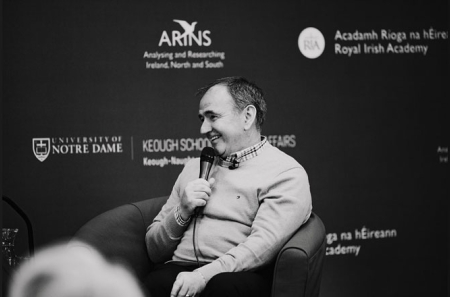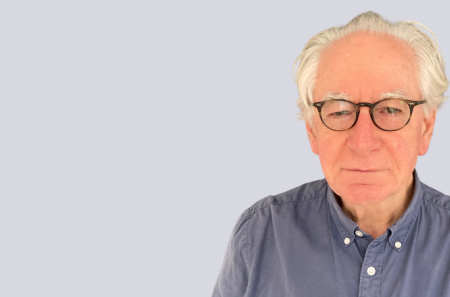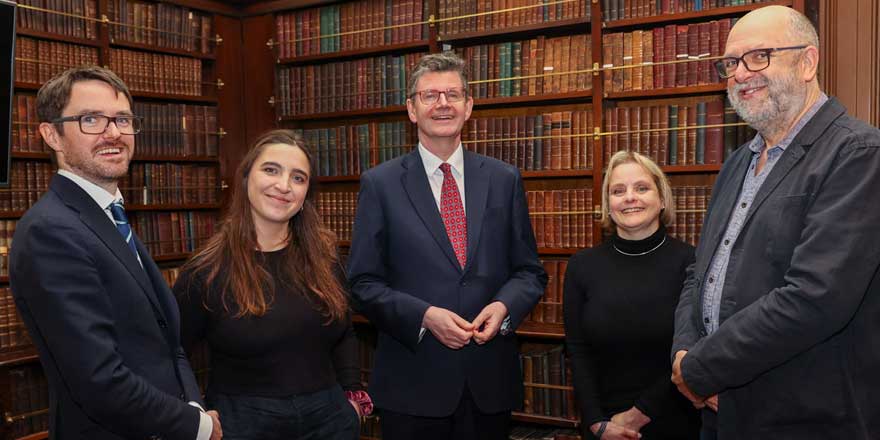
You can be anything in Ireland now, as long as it’s not English - a panel discussion
20 November 2023'You can be anything in Ireland now, as long as it’s not English', a panel discussion held in the Royal Irish Academy on Monday, 20 November 2023
Luke Sheehan
How have times changed in the perplexing world of British and Irish identity, and where do we stand now? Did the brimming book of condolences at the British Embassy in Dublin after Queen Elizabeth’s passing last year, for example, reveal an emotional tilt among Irish people?
For one audience member at ‘You can be anything in Ireland now, as long as it’s not English,’ the latest ARINS panel discussion at the Royal Irish Academy in Dublin, that shift was real and sharp. Sharing with the audience that he could remember being a pupil in school in Kerry when King George VI died (1952) – and seeing half his classmates give a cheer – for one gentleman at least, the 60-year movement towards sympathy over the death of George’s successor on the throne was striking. “I doubt anyone would react that way in a classroom now,” he added. Even the question of the ‘Royal’ element of the name of the hosting academy itself was material for a probing discussion on history and identity that covered questions from the Good Friday Agreement to possible Irish re-unification.
Looking back over decades (and centuries) of British and Irish connections and gauging the optimal direction of travel for the future was the task of academics, a researcher, a writer and a diplomat making up the panel. For the past year, the Dawson street home of the academy has been hosting events treating of the tricky details of our shared history, touching on names and nicknames, flags and borders and other touchy subjects, all as part of the ARINS remit to explore both “Ireland North and South”. Today was the occasion to bring in the question of what Britishness in Ireland (and Irishness in Britain, along with every permutation and crossover) might mean. A panel of speakers with deep experience of Ireland and Britain discussed amongst each other and with an engaged audience where these concepts have taken us. Quite a few surprises and creative points of view were revealed over 90 minutes.
The speakers were: Neil Robinson (Professor of Comparative Politics at the University of Limerick); Etain Tannam (Associate Professor of International peace Studies, School of Religion at Trinity College Dublin); Paul Johnston (Ambassador of the United Kingdom to the Republic of Ireland, appearing in a personal capacity) and Finn McRedmond (journalist with the Irish Times and New Statesman).
As introduced by chair Barry Colfer (Director of Research at the Institute of International and European Affairs), the speakers were people with rare insights into the living reality of Britishness and Irishness, with many having lived in both countries for long periods, having been born of parents from both sides (Finn McRedmond) or likewise seen life, love or labour mechanics join their lives to both.
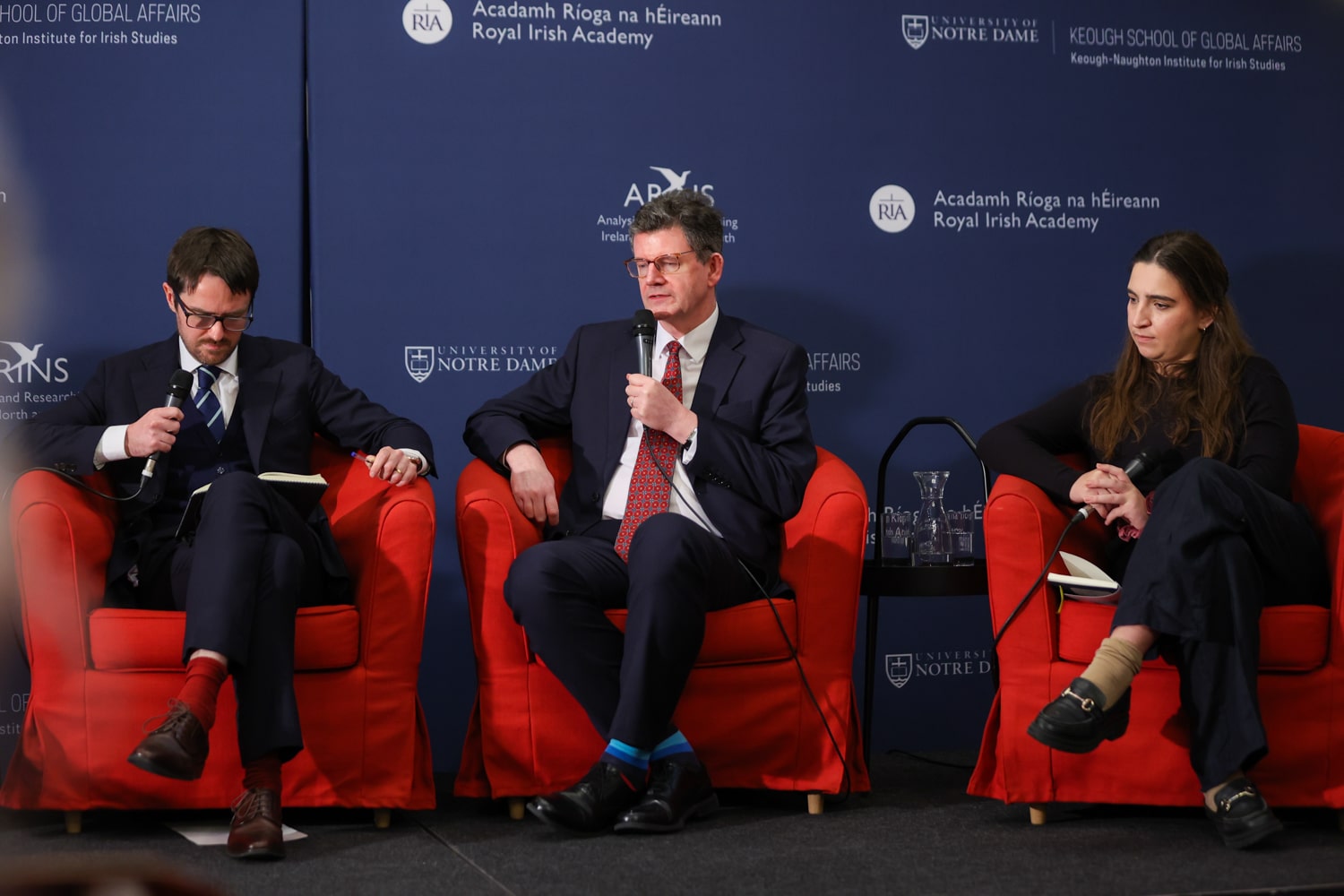
Pictured (l-r): Barry Colfer, Paul Johnston, Finn McRedmond
In the background to the seminar is the undeniable reality of changing politics and demographics. Barry Colfer referenced the 2022 census that revealed approximately 25 per cent of residents in the Republic of Ireland were born outside its shores. Each of the panelists then introduced themselves, sharing their influences and curiosities. For Paul Johnston, for instance, despite having lived from New York to Stockholm and beyond, it was in Ireland that he most had occasion to “question [his] Britishness.” For writer McRedmond, correcting the perception of England as an excessively nationalist place (a POV many in Ireland hang on to) is a matter of importance.
Professor Neil Robinson, meanwhile, despite growing up in England, found “I had to come to Ireland to become English. Englishness was not a defining feature of my identity growing up.” Each of these commentators then, would share insights based on having ‘skin in the game’ of British (and or English) and Irish identities.
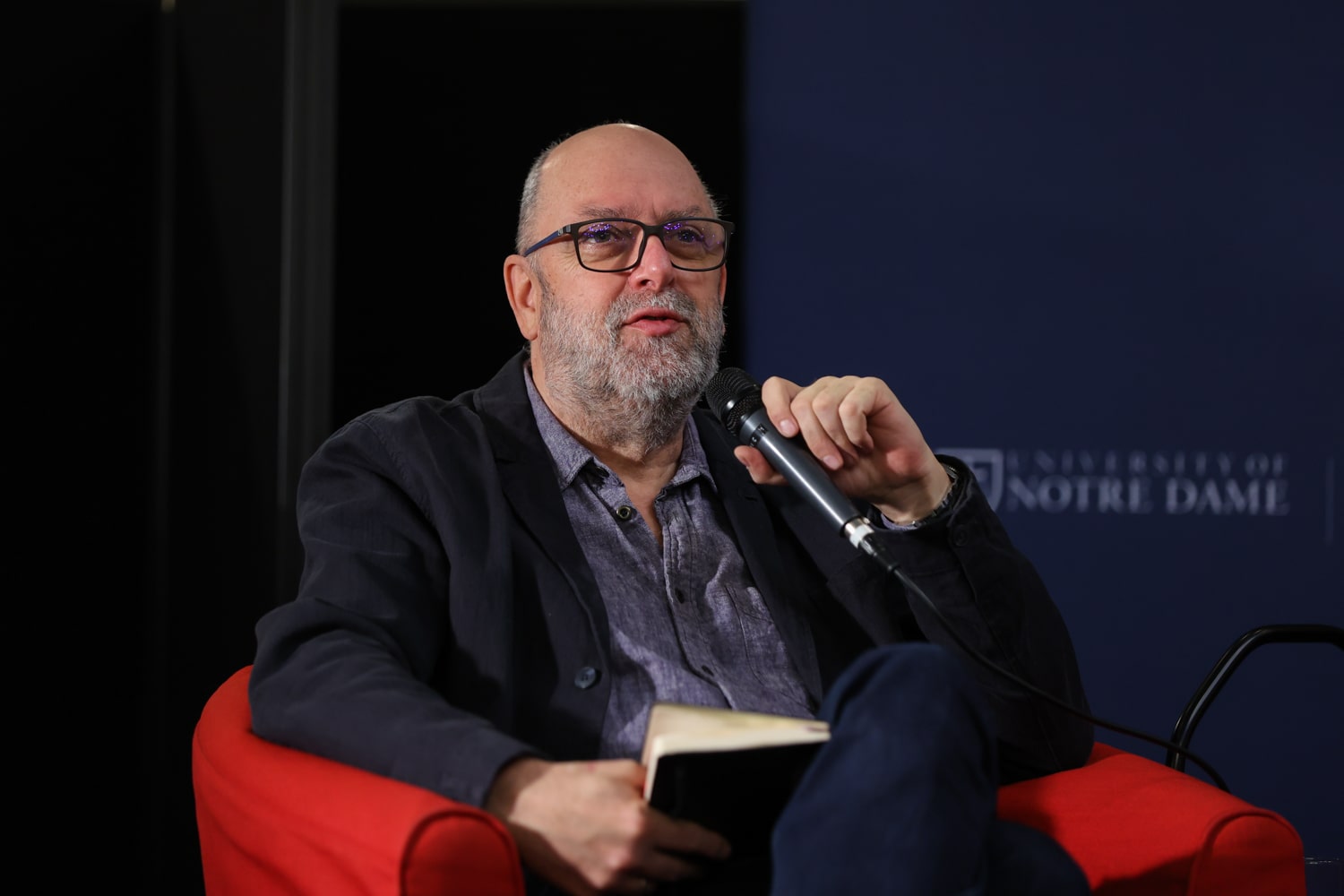
Pictured: Neil Robinson
Steered by Colfer and by audience questions, conversation returned to the issue of citizens young and old not knowing enough about the history of the "other". But is that truly a problem? According to McRedmond, “English history is vast and expansive… and young English people will know more about India than young Irish people. What is a problem is when there is a lack of knowledge at a high level.” When diplomats and officials, in other words, do not know sensitive details of history (such as the meaning of the Red Hand of Ulster) that can pose a problem. Dr Colfer agreed, adding, “I’ve often met professional people who ought to have known better – but didn’t.” Professor Tannam quoted Oscar Wilde: “History is something English people should remember and Irish people should forget.” She observed that “There is ignorance in both places, we’re more aware of it and perhaps over-sensitive to it. How few people know about the good Friday agreement is a bigger problem.”
Barry Colfer asked Neil Robinson about academic disparity of interest. “There are Irish studies professors in Britain… but where are the British studies in Ireland?” Professor Robinson countered that, important questions like Northern Ireland are not studied very much where they should be. In the past, in departments of politics, “It would have been rare to find someone who’d taken an Irish studies course.” Returning to the UK after decades in Ireland, he was eager to see what, if anything, had changed. “People teach subjects in which Ireland plays a part… but there is very little specific Irish content at UK third level [education] outside the humanities.” James Joyce and Oscar Wilde, overshadow the Good Friday Agreement. Mr Johnston added that he “didn’t learn much about Ireland, growing up in Scotland, nor France or Germany for that matter… Many Irish have a limited knowledge of British history and vice versa.” He added that a panel he shared on Oliver Cromwell with Fintan O’Toole (‘Editing Cromwell’ in TCD last year) revealed just how divided the knowledge and perspectives tend to be, on certain sensitive topics, observing “there is an asymmetry that education reinforces."
More audience insights and questions sought to shape and re-shape the debate about how Ireland and Britain navigate each other and relations with the rest of the world. Said one attendee, “Ireland was England’s first colony and Northern Ireland may be its last. We need to be honest about our history… and we are finally having conversations about it. We may also have conversations in the future about the Irish role in Empire – there were many Irish soldiers in India, but people are unaware or they don’t want to talk about it.” Finn McRedmond would echo the point, acknowledging that “Ireland played a role in Empire, which makes for a complicated and muddy picture… this leads us to have a tendency to be dishonest about our past.”
In all the complexities of history and identity, who is doing the most work to question and construct a new identity? For Robinson, “There are complexities that British side could do more to address, not only treating the imperial past, once it’s got over its current hysteria over ‘returning to lost Englishness’.” Colfer offered another question to Neil Robinson, “Can you chart how your experience of an English person in Ireland has evolved since the mid-90s?”
Robinson replied with an anecdote about the close of the peace process in the 90s. “We arrived for a visit to Ireland on the Morning of the Good Friday Agreement… The first question (his wife asked) was, ‘How are things going in negotiations?’ The reply was “nothing to do with us!" That attitude has changed.” One cause for this? The newfound economic confidence from Dublin to Cork and beyond, was bruised after the 2008 crisis.
Etain Tannam observed that “Interest in a united Ireland has changed, it is more pronounced among young people.” Citing the Irish Times/ARINS survey on reunification (see example story by Pat Leahy here) a fear of violence as a reason not to pursue re-unification is diminishing among younger people. “Do young people not fear a return to violence because they did not grow up with the Troubles?” asked Tannam.
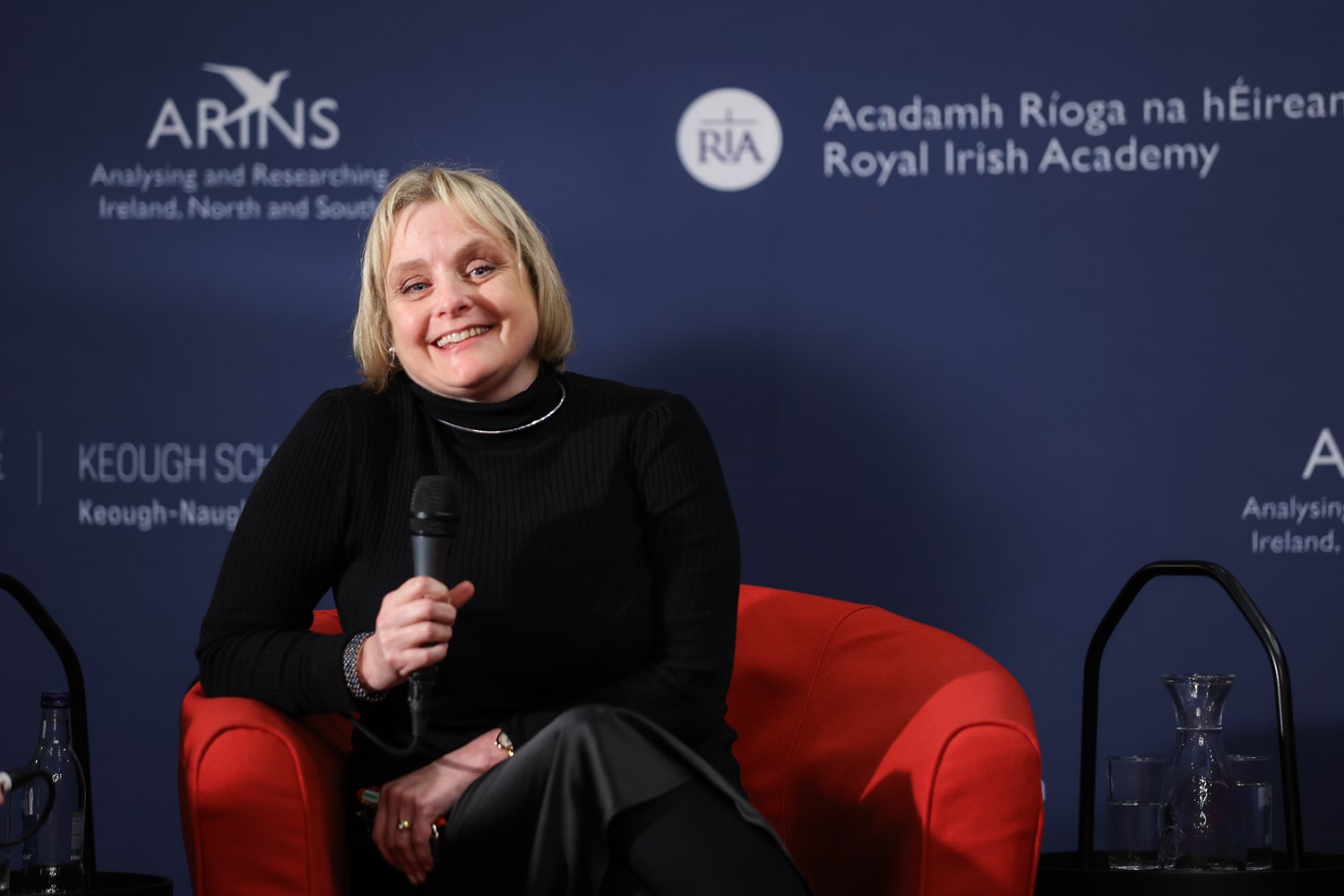
Pictured: Etain Tannam
Paul Johnston spoke from personal insight, arguing that, “Unlike Germany and France, Britain didn’t have to reflect on a clear and specific shame around WW2. The pride about the country’s role in the war carried forward, coming out for example in the Scottish rejection of independence, in Brexit and now as the question of Northern Irish re-unification comes back. Questions of class, of age group and other factors make everything complex in our shared history.”
In the last third of the conversation, thorny questions of Englishness, nationalism, race, populism and Brexit were tackled. Colfer asked Professor Robinson, “Have your attitudes to Englishness changed since Brexit?” Robinson reflected, “I’ve seen it as something much more important than before… Ideas of Englishness have been used culturally and politically over recent years. They have evolved at a greater rate than they did during my childhood. In fact, it wasn’t there! There were a few books about Englishness [for example Paul Gilroy] but they were exceptions rather than the norm. It’s got sidetracked into binary oppositions… but over time it will probably take on shapes and forms that are progressive.”
According to Etain Tannam, speaking on matters of race and Brexit populism, “The question of Brexit and nationalist populists stirring feelings for votes is nothing new…” What was tragic, she argued, was that the “UK was seen as successful multicultural society. It’s unfortunate to see that change. The rise of Brexiteerism has blocked us from seeing what a thriving multicultural society it was. The result is damaging to our relationship.”
For Paul Johnston, looking at the makeup of leadership in the UK invokes pride, with it being “often more representative of society than in other places.”
A final story from journalist McRedmond on the vexed question of defining identity saw her bring up George Orwell. Writing ‘England Your England’ as bombers flew overhead during WW2, the great writer was reduced to making “lists of things English people like… queueing etc. But Irish people like queueing as well! No-one has been able to put words to national identity. We don’t even know what Englishness is!”
Barry Colfer asked: “Is that bad?” McRedmond responded that “Constructive ambiguity can be a good thing!”
The close of discussion opened to the audience. Stories of sports rivalry, triumphalist dogged support of one national team over another (even when one’s own team was not playing) vied with ideas over the decades. A gentleman described attending a Northern Ireland v. England soccer game in the 80s, and was shocked when NI supporters chanted about Argentina and the Falklands to taunt England supporters – just a few years after the war.
This led to the attendee with a long memory – back to the death of King George VI. “Someone ran into the classroom and said ‘the King is dead!’ There was a cheer from one half of the class …that could have been a Kerry republican reaction. When Elizabeth died probably there probably wasn’t cheering in classrooms. 60 years changed a lot.”
We can even find a story about Kerry during that time last year, following the Queen’s passing. A Killarney councillor made a book of condolences available in Tralee, receiving signatures and delivering these to the Dublin embassy. That and the other reactions one saw signified a definite shift. For this writer, not quite as old as the gentlemen who recalled the passing of the last British monarch, there was a not-too-distant time when the British embassy was more likely to be the object of security threats than bouquets, and the broad reaction to the death of the head of state might have been very different.
Times have indeed changed, and this nuanced panel from ARINS mapped out multiple parts of the journey today.
----
ARINS is a joint-project of Keough-Naughton Institute for Irish Studies (Notre Dame) and the Royal Irish Academy.


